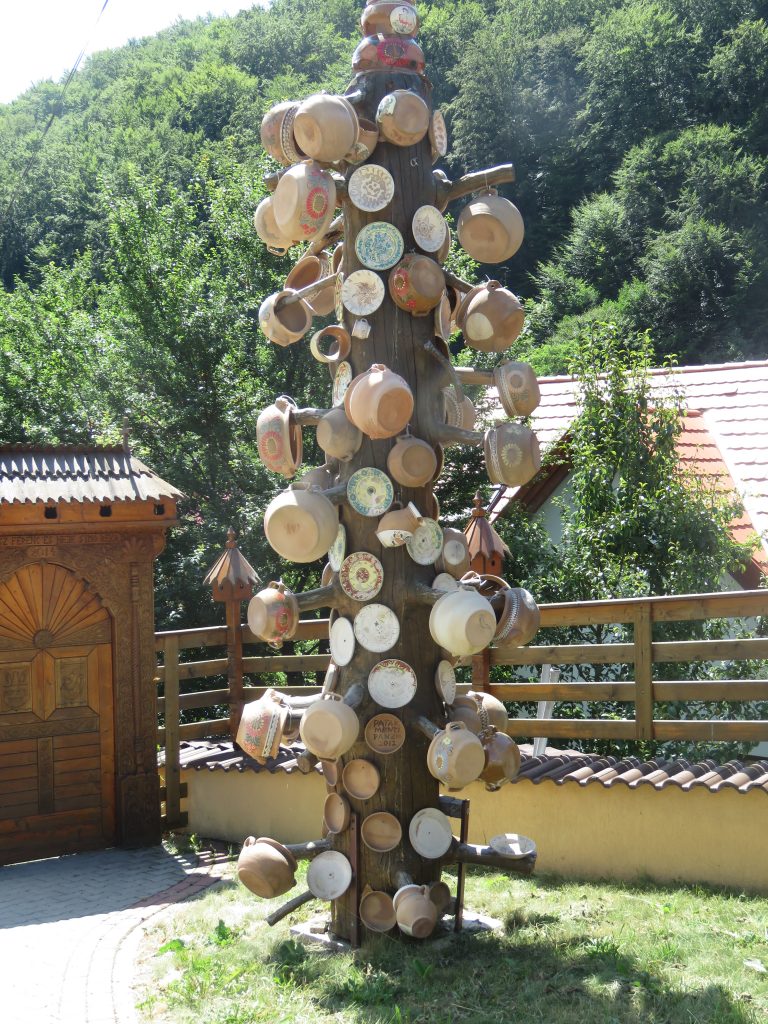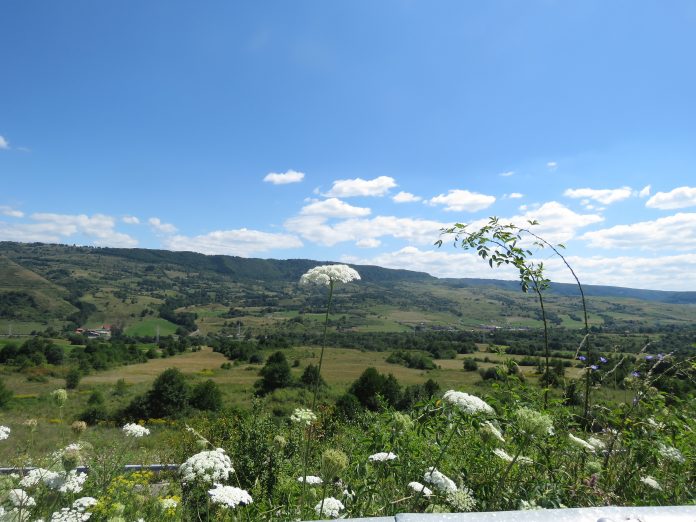The village of Corund lies in the rolling hills of eastern Transylvania and prides itself on being the pottery capital of Romania.
Villagers in this Hungarian-speaking region have been making pottery for more than 600 years and selling it locally and around Romania before communism collapsed in 1989, and abroad after the country opened up.
BAD SOIL
The village was founded in 1332 in a land of meadows and woods, with a varied climate. But the soil was poor. Wheat doesn’t grow here, and potatoes are about the only crop suited to the clay-rich soil.
“Pottery-making became a tradition from the beginning,” mayor Mihaly Katona told universul.net last week. “Agriculture isn’t good here; if you dig 50 centimeters down, you find clay.”
POTTERY=PROFIT
It’s pottery that has brought wealth and notoriety to the community of 6,500. Although the county is considered poor, the village is full of large, imposing houses and SUVs (for practical purposes in this hilly, rural terrain, rather than showing off).
Normally, tourists from neighboring Hungary, Germany, Britain and even Israel stop here and snap up handmade plates, vases, bowls, and ashtrays decorated with tulips and peacocks, crafted from clay extracted from the dark soil.

CORONAVIRUS IS BAD FOR TOURISM
This year, however, the coronavirus pandemic has frozen out foreign tourists, and the few that trek to the area are from Romania.
“We are getting 200 to 250 tourists a day,” mayor Katona told universul.net. “If it wasn’t for Covid, there’d be many more.”
“Business is very poor this year because of the coronavirus,” said Ferenc Szasz, 20, in halting Romanian. He helps run the family business _ a pottery and a guest house with outdoor hot tubs_ built with European Union funds.
“Szasz was hesitating, but I told him he should take the funds otherwise he’d miss the offer and there wouldn’t be another ‘train,’” the mayor said.
THE HARGHITA WILDS
The village is in the county of Harghita, an unspoiled swath of land in Transylvania known for its meadows, salt mines, Borsec mineral water, bears…and Corund or ‘Korond’ pottery, the latter being the Hungarian name for the village.
All vendors tell me the same story: sales are down, few tourists, nobody from Hungary this year because they can’t afford to stay in quarantine when they return. (Romania had more than 69,000 cases of Covid-19 on August 15 to Hungary’s 4,900).
More than 85% of people in Harghita belong to the Hungarian minority, or more precisely the Szekler group. The Szekler turquoise and yellow flag can be seen flying near Catholic and Reformed churches or on houses (often painted green to match the Hungarian flag.)
In some ways it was easier under communism, when residents spent the summer months selling pottery around Romania. In the 1990s, there were 800 families making pottery, which has dwindled to about 100, the mayor said. There are some wholesale businesses that sell the wares to Hungary, Poland and Austria
DETERMINED
But locals are determined to keep the tradition going, virus or no virus. “We need to keep people here. Families have to look after each other and their children stay to help which is why they are still doing it,” mayor Katony said.
Nevertheless, Corund needs to develop more infrastructure to keep the tourists for longer. “We need to offer more to tourists so they stay 2-3 days,” he said.
Often tourists stop in the village for a couple of hours and then move on to nearby Praid, which has a salt mine, or to the resort of Sovata in Mures county.
BEARS
Coronavirus cases may have spiked in Romania, but locals joke they are more afraid of bear attacks than the virus which so far hasn’t hit their remote and sparsely populated area too badly.
On August 15, Harghita had reported a total of 631 cases, and was in 34th place out of Romania’s 42 counties.
Bear sightings and attacks have risen this year, authorities say, with 70 calls made to authorities in June. Bears stray into villages and people’s land in search of food, and have killed livestock locals say.
OLD-FASHIONED VALUES
If the Saxon villages have Prince Charles to sing their praises, Harghita county has Rosie Cornwallis, who moved from India to the village of Ocna de Jos down the road from Corund and rents out a delightful loft with a balcony to tourists offering stunning views over the valley where I stayed for a couple of nights.
“They have old-fashioned values such as helping your neighbor, which is not so true in the UK. There’s a local lady makes me cakes when I have people around,” says Ms Cornwallis, who is renovating an old house.
The loft which was designed by Ms Cornwallis and built by local craftsmen is exquisitely decorated with a fusion of styles: Corund pottery and bejeweled cushions from India, with touches of England in pretty harmony. The showpiece is a slipper bath which stands proudly in the middle of a large bathroom.
Ms Cornwallis, or Rosie as everyone calls her, is touched by the people she’s met here. “A woman lent me a bike for three months and when I bought a toaster, they tried it out for me before I bought it,” she said.
“There are wildflowers which are on the endangered list of species here and birds and butterflies because they are not poisoning the land (with fertilizers). You can walk around as there aren’t fences, but there’s also a lot to do,” she explained over an English cup of tea.
“There are walking trails and lakes, little museums, nice shops and boutiques that sell teas and bath salts.”
LEFTOVER STOCK
But in Corund, most potters aren’t shaping the dark colored clay into vessels and firing their kilns at the moment as they hadn’t predicted a four-month month lockdown. There is stock to shift and not enough customers.
The ceramic vessels which are glazed and decorated in red, blue, green, mauve and brown, are popular as presents and home decorations are currently sitting on shelves and customers are few and far between.
A couple from Craiova, a city in southern Romania are on vacation and buy a few pieces. They are appreciative of the pretty plates and vases.
Roszalia Ilyes, the wife of the one of Corund’s most established potters, wraps their purchases and describes what it is like being at the heart of a profitable business.
Decades ago, the family tried out farming and bee keeping but pottery was more profitable and predictable.
“The clay has to be good which costs more,“ she says scooping up a handful in the cellar and flinging it back. “And you have to paint and glaze it well.”
“Because of the virus, I have a lot of leftover goods, so the kilns aren’t on.”
LOVING THE CLAY
Husband Mihaly Ilyes, the potter, speaks less. “I’ve been doing this from childhood; I learned it from my parents. You have to like the craft and really enjoy working the clay.”
The demand for the pretty pottery is constant with consumers drawn to something more unique than generic supermarket plates.
“Young people want different designs which we are doing, and we make customized pieces such as plates for wedding anniversaries.” Mrs. Ilyes said.
“There aren’t many tourists, so there’s some stress. But we are still open for business.”




















